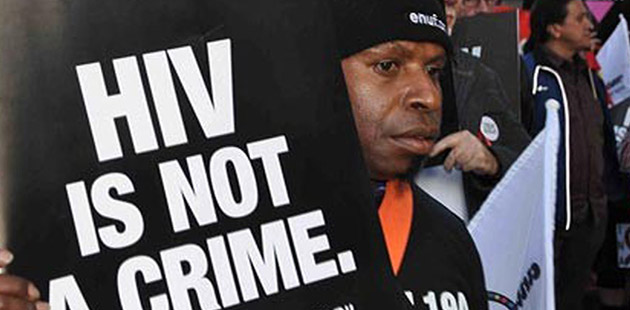 Criminal charges should only be brought against people who transmit HIV in extreme cases because criminalising HIV transmission has a range of adverse implications for public health.
Criminal charges should only be brought against people who transmit HIV in extreme cases because criminalising HIV transmission has a range of adverse implications for public health.
The call comes after the arrest of a Sydney man who has been charged with recklessly inflicting grievous bodily harm. The man pleaded not guilty on Thursday when he appeared before Sydney’s Central Local Court via video link from jail. Police opposed his bail application, arguing that the man was at risk of fleeing the country and posed a threat to community safety.
While we have said that we can’t comment specifically on the case, bringing criminal proceedings against people who are alledged to have transmitted HIV is a complex issue.
“The threat of criminal penalties can create negative public health impacts,” said ACON CEO Nicolas Parkhill. “The threat of imprisonment may act as an incentive for people not to know their HIV or STI status in order to shield themselves from such a provision, possibly leading to an increase in transmission rates.
“Such provisions may also create a disincentive for people to get regularly tested for HIV and other STIs and possibly from using risk reduction techniques such as consistent condom use. In addition, the reliance on people with HIV to disclose increases stigma and discrimination against people with HIV, including from HIV negative people.
“ACON recommends that the responsibility for discussing and disclosing HIV status belongs to every individual – not just people with HIV. For these reasons, ACON believes the most appropriate response to cases of HIV transmission is a public health intervention rather than criminal prosecution.”
“We urge the police to make better use of the public health system when they become aware of cases where there is HIV risk. Police should routinely liaise with health authorities if they believe there is public health risk so that public health authorities can appropriately respond.”
We acknowledge the need, in certain circumstances, for the use of both criminal and public health law provisions in relation to HIV transmission, as well as the importance of people understanding their obligations under the law.
“However, there is very rarely criminal intent in HIV transmission cases,” said Mr Parkhill. “The vast majority of people with HIV actively seek to protect their own, and their partner’s, sexual health. In these circumstances, legal intervention is not needed or appropriate.
“Due to a range of social and psychological factors, some people may engage in behaviour that endangers their own, and their partner’s, sexual health. In these circumstances, public health interventions should be used to manage those who are at risk of infecting others with HIV or other STIs.”
“It is equally true in other parts of people’s lives that we sometimes do things that can harm our health or others’ health, yet HIV seems to be particularly targeted by the law. There are only exceptionally rare instances of a person living with HIV intentionally exposing others to the risk of HIV transmission. ”
Nicolas Parkhill concluded by saying that many people in our community can find open discussions about sexual health daunting or confronting and it’s a skill that people need assistance with.
“As a peer-based organisation, ACON has long acknowledged the value of peer education. In relation to HIV in particular, educating and up-skilling gay men to empower them to have conversations about sexual health with their partners is a key part of HIV prevention and ACON has a range of resources, workshops and other initiatives aimed at preventing HIV transmission.”
“For HIV positive men for example, ACON and Positive Life NSW run a weekend workshop called Genesis which assists guys to better understand a broad range of issues related to HIV such as stigma, treatment and importantly, disclosure. We also partner with other organisations to support provide practical assistance to have these sometimes daunting conversations, sharing stories through the Disclosure Project (www.disclosureproject.org.au).”
ACON provides a range of counselling and support services for people with HIV including people recent diagnosed with HIV and those at risk of HIV. Contact: 1800 063 060 or visit: www.acon.org.au for details. The HIV/AIDS Legal Centre (HALC) is a community legal centre that specialises in HIV related legal matters. HALC provides advice and support to people living with and affected by HIV. For more information, visit: www.halc.org.au for details.
Image: courtesy of ACON
